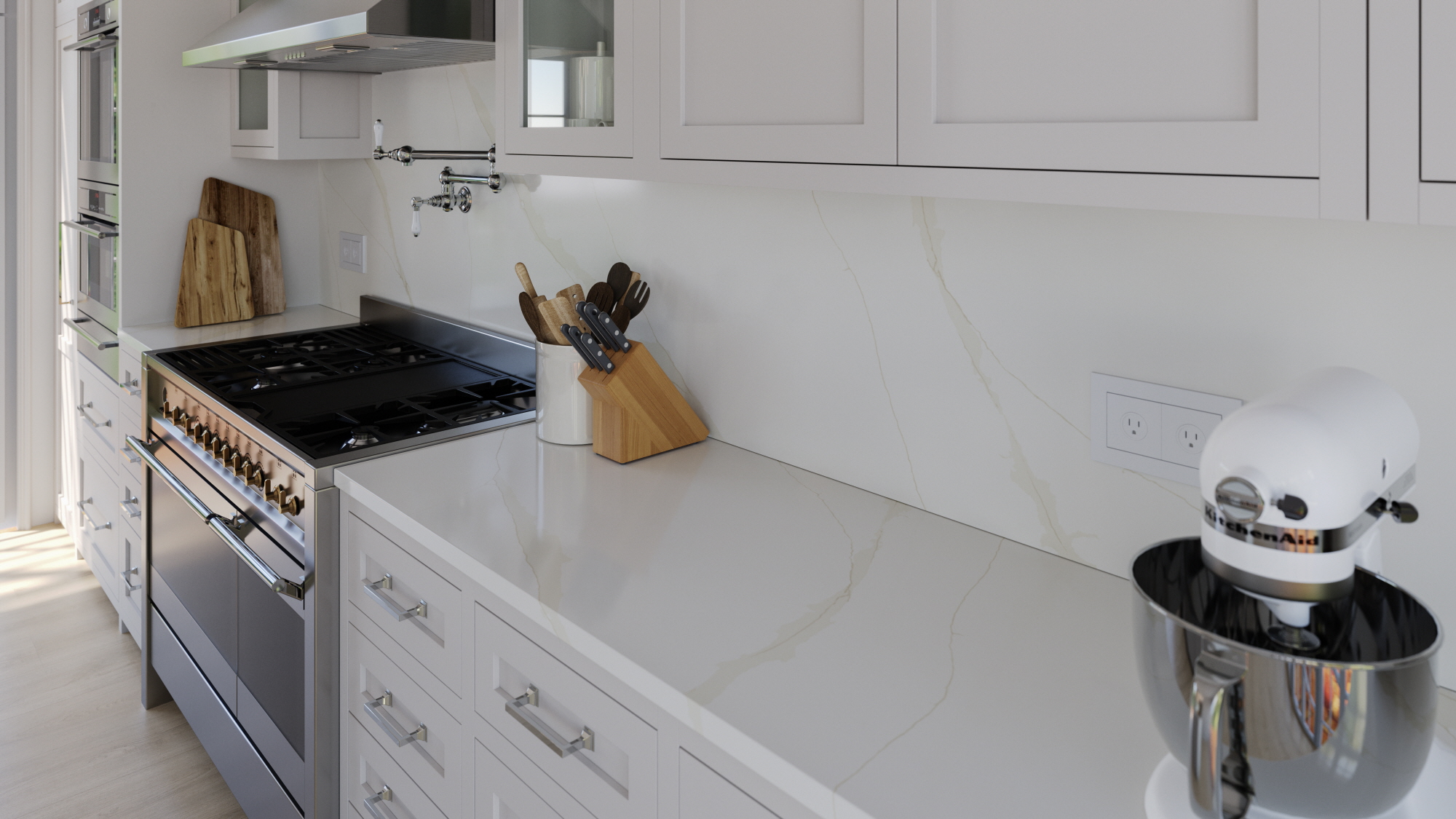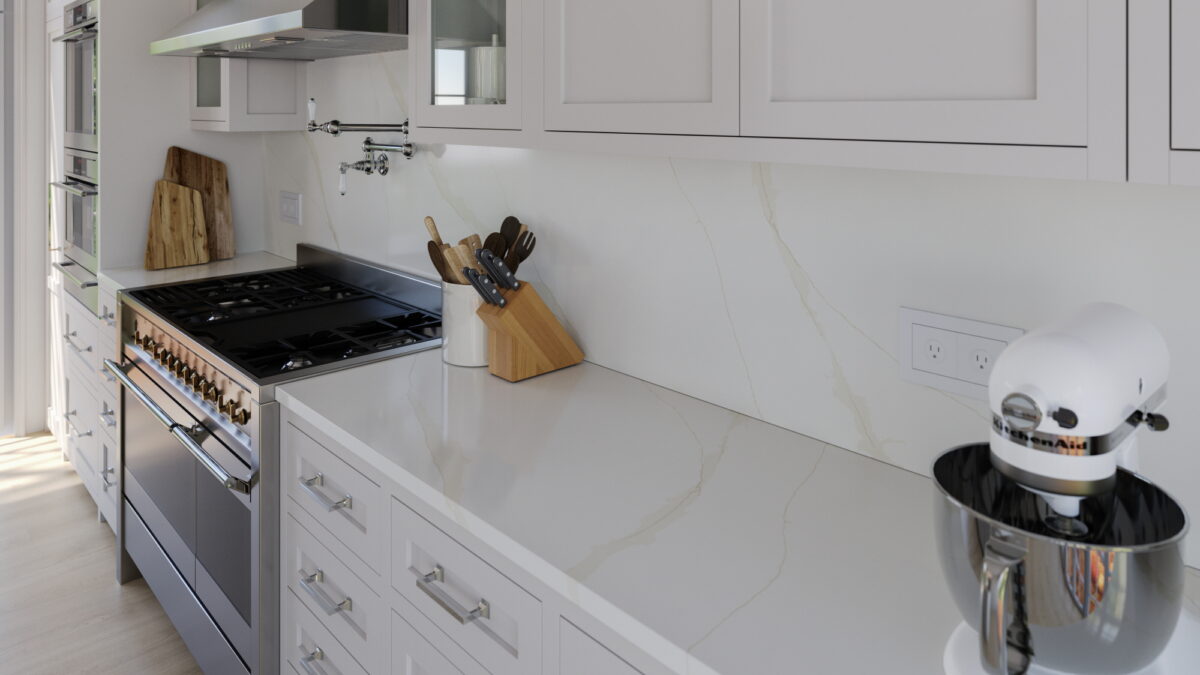
Quartz has risen in popularity as a top choice for kitchen backsplashes, combining style, durability, and versatility seamlessly. This article delves into the reasons that make quartz an exemplary selection for your kitchen backsplash. We will discuss its advantages, compare it with other materials, address considerations prior to installation, and answer common questions.
Why Quartz for Backsplashes
Composed of natural quartz crystals fused with resins and pigments, quartz is a man-made material that boasts a durable, non-porous surface. It stands up to stains, scratches, and heat, making it a prime choice for kitchen backsplashes that must endure the demands of everyday use. Its long-lasting beauty and functionality assure that it remains pristine for years. Furthermore, with an extensive spectrum of colors, patterns, and finishes available, quartz offers the flexibility needed to craft a tailor-made backsplash that enhances your kitchen’s overall design aesthetic.
Quartz vs. Other Materials
Quartz stands out when compared with other common materials for kitchen backsplashes like tile, glass, or natural stone, due to its multiple advantages. Unlike tile, quartz doesn’t necessitate grout lines, which simplifies cleaning and maintenance. It is also more durable and less susceptible to chipping or cracking than glass, making it a wise choice for high-traffic areas. In contrast to natural stones like marble or granite, quartz offers a more consistent color and pattern, which facilitates a seamless blend with your kitchen countertops and cabinetry.
Considerations Before Using Quartz as Backsplash
Before deciding on a quartz backsplash for your kitchen, it’s important to weigh several considerations:
Installation Challenges
Although the installation of quartz is generally straightforward, the importance of engaging a professional with experience in quartz cannot be overstated. Due to its weight, quartz demands precise cutting and fitting for a flawless finish.
Budget Considerations
The cost of quartz backsplashes can vary widely, influenced by the quality of the quartz, dimensions of the backsplash, and the intricacy of the installation process. Setting a clear budget and obtaining quotes from several reputable providers and installers is crucial.
Accurate Measurements
For a perfect fit, accurate measurements of the backsplash area are imperative. Remember to account for any potential obstructions like outlets or switches during the measuring process.
Coordination with Countertops
In selecting a quartz backsplash, the compatibility with your current countertops is a key factor. With a broad spectrum of colors and patterns available, quartz offers the versatility to achieve a harmonious look in your kitchen.
FAQ
Frequently Asked Questions about Quartz Kitchen Backsplashes:
Is a quartz backsplash heat resistant?
Absolutely, quartz’s high heat resistance makes it an excellent candidate for areas behind stovetops and ranges. Although it is resilient, to safeguard its surface, using trivets or hot pads for direct heat is advisable.
How should a quartz backsplash be cleaned and maintained?
Maintaining a quartz backsplash is straightforward – a simple wipe with a damp cloth and mild detergent suffices for cleaning spills or stains. It’s crucial to steer clear of abrasive cleaners or scrub brushes, which could mar the surface.
Can damaged quartz backsplashes be repaired?
Despite quartz’s robustness, it’s not immune to sharp objects or intense pressure. Fortunately, professional quartz installers can often mend minor scratches or chips using specific techniques and products.
Is quartz considered environmentally friendly?
Quartz emerges as a more eco-conscious choice in comparison to natural stone, thanks to its production involving sustainable methods and the incorporation of recycled content. Its non-porous nature also inhibits the growth of mold, mildew, and bacteria, promoting better indoor air quality.
Quartz distinguishes itself as a superior selection for kitchen backsplashes, blending durability, adaptability, and aesthetic appeal. Its extensive palette of colors and patterns, coupled with ease of maintenance and resilience against heat and staining, renders quartz a functional and stylish addition to any kitchen. Whether you’re updating your current space or designing a new abode, integrating a quartz backsplash can significantly amplify your kitchen’s allure.
For additional inquiries about incorporating quartz into your kitchen backsplash, feel free to reach out to us at LX Hausys.

